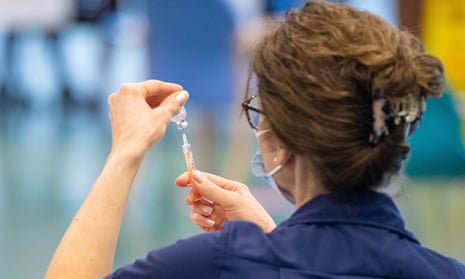Ministers are considering giving people a different type of Covid vaccine as an autumn booster, it has emerged, after early results from “mix and match” trials appeared to show promise for an enhanced immune response.
Four different coronavirus jabs have been approved for use in the UK, with more under regulatory review. While people are currently offered two doses of the same jab, researchers have been exploring whether offering a second dose of a different Covid vaccine could generate a stronger immune response.
It is also expected that people will be offered a third, “booster” injection, potentially in the autumn, in part to protect them against variants with some resistance to existing vaccines. One possibility being looked at is that this third jab could be of a different type to people’s initial two, a government source said.
Trials worldwide are exploring the impact of mix and match doses. In the UK, the Com-Cov study, launched in February, is investigating the possibility of using the Oxford/AstraZeneca, Pfizer, Moderna and Novavax vaccines. The Sunday Telegraph reported promising results from separate trials of more than 600 people in Spain and 300 in Germany.
A further study has suggested the approach could bring benefits. The research, yet to be peer-reviewed, compared the immune responses of 26 individuals aged 25-46 who were given one dose of the AstraZeneca jab followed by a dose of the Pfizer jab with those given two shots of the latter.
The results suggest those given the mixed regime had an almost four-fold higher median level of neutralising antibodies against the Alpha variant, first detected in Kent, two weeks after their second jab.
While the levels of neutralising antibodies towards the Beta variant, first discovered in South Africa, were lower than towards the Alpha variant in these individuals, and at similar levels for the lineage first discovered in India, they were still higher than among those given two doses of the Pfizer/BioNTech jab.
While further research is needed among larger groups and participants of different ages, scientists say the findings are encouraging – although not a surprise.
“Using different vaccines to prime and then boost the immune response is frequently associated with generating a more robust immune response,” said Lawrence Young, a virologist and professor of molecular oncology at the University of Warwick. The different technologies involved in the jabs allowed the immune system to be presented with the same target but in a slightly different way, provoking a more diverse immune response, he said.
Young added that the more robust immune response may provide better protection from variants but questions remained, including what level of different components of the immune response offered the best indication of protection against symptomatic and asymptomatic infection.
“Nevertheless, mix and match vaccination bodes well for the future efficacy of booster shots to soup up protective immunity against virus variants,” said Young. “These booster jabs may be even more effective if tweaked to include the variant spike proteins – something currently being trialled by Moderna and very soon by other vaccine manufacturers.”
Prof Deenan Pillay, a professor of virology at University College London, said the mix and match approach offered more global flexibility. “We await the results of more pilots. But overall this is good news, since it means that booster doses of vaccine are not limited by supply of one particular vaccine. It also will allow flexibility when considering third booster doses in the future,” he said.
However, there may be other factors to consider. “The only caveat is potential side-effects, remembering that the adenovirus and mRNA vaccines are both new vaccine platforms,” said Pillay. “One study has shown a slight increase in side-effects following mixed dose administration, whereas this was not observed in the German study.”
